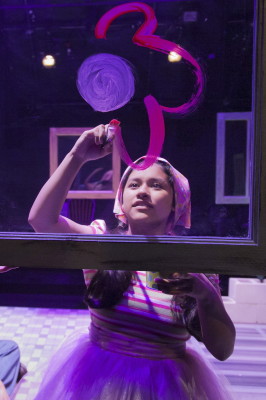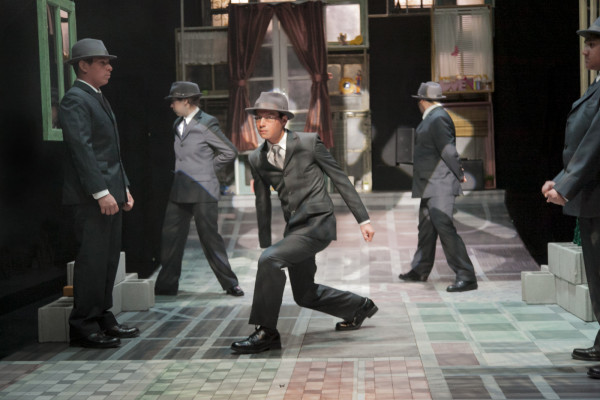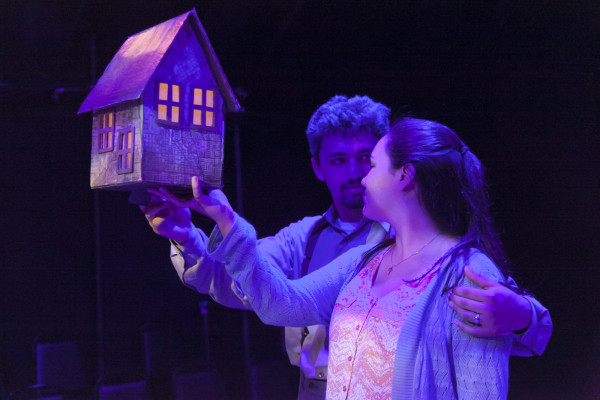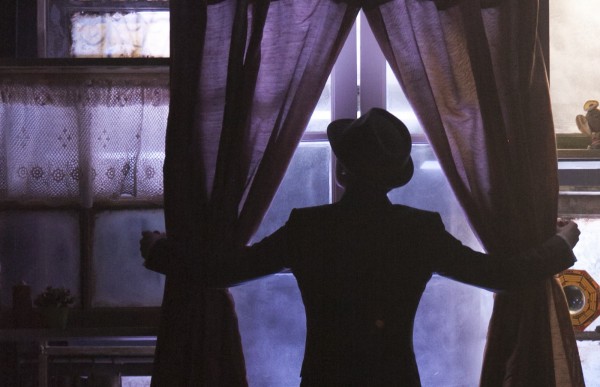
I Will Kiss These Walls (2013)
The play begins with an army of builders wielding hammers, electric drills and caulking guns. They fall into a wonderfully complex stomping, vocalized and human rhythm. It is a song of future dreams and hope. The house they build is a beautiful assemblage of windows.
Image: Young Penelope (Paloma Morales) runs through the house and out the back screen door, falling with her hands out into the wet cement of the new porch that her grandpa is building. She feels horrible for ruining his beautiful new porch, but her grandpa (Vincent Meredeth) calms her down and helps her write her name there.
Image: Penny’s Gamee (Stephany Perez) is working in the house, defined on stage by six windows hung from wires and in the garden, where brightly colored flowers sprout from concrete blocks on stage. Penny’s paintings of flowers on the window make it hard to distinguish where the house ends and the garden begins, but it is clear that this isn’t a building and an agricultural project — this is Grandpa and Gamee and Penny’s home. Somehow this scene has managed to encapsulate all the love and warmth and hope and united struggle that creates, over many years, a home out of a house. The effect is similar to the well-known montage scene in the Pixar film Up that gives us an entire lifetime of the main character’s marriage from new love to old age in a matter of a few minutes. This is powerful stuff.
"APTP has created a new form: a theater of hope. This is what theater ought to be."

Then the music changes from a traditional folk melody to something strange and techno-sounding. Men and women in pinstriped suits begin walking through the house and hanging x-rays of lungs on the windows. Just as quickly, Gamee grabs them down and rolls them up and hides them in the flower garden, but they keep coming faster and faster and spinning her around until she lies on the ground. Grandpa and Penny lose Gamee. Later, the pinstripe suits return with notices and letters and soon Grandpa and Penny are losing their home to eviction.
Then, with a framing story that sort of connects to The Wizard of Oz, but only a little bit, Penny visits three other families who suffer eviction. As she does this, we see how utterly devastating the experience of losing a home is, but we also see the ways the community can stand by that family and support them emotionally — and in some cases, even save them from foreclosure. We also get to enter into other lives as deeply and as quickly as we have entered Penny’s life. Albany Park Theater Project (APTP), in the Albany Park neighborhood of Chicago, uses dance, song and, above all, remarkable acting to tell the real stories of families in their neighborhood. This is what theater ought to be.
You could use terms like “political theater” or “activist theater” to describe what this is, but that conjures up images of activists with bullhorns doing poorly-written and poorly-acted skits designed to shame or embarrass selected officials — or at least get some press coverage. This is not that. First of all, I Will Kiss these Walls is not really about the politics of the situation, it is about the real stories of people who are forced to leave their houses vacant, and sometimes about people who see the injustice in such an action and stand with the families against banks and local officials seeking to evict them. Later in the play, we meet three people who break into foreclosed houses and illegally repurpose them into homes for displaced families. But this is not about making a particular political party look bad, or casting blame, or advocating for a particular piece of legislation, or even about glorifying or siding with the movement that is doing this — the play tells this story so that we can see that there are intelligent alternatives that politicians seem unable to see.

I Will Kiss These Walls (2013)
I saw the play with a friend who used to be a banker. One would think he would be opposed to those who break into the foreclosed houses in order to install a homeless family there on the grounds that is illegal or immoral. After all, these people are taking what is not theirs, what belongs to a bank. But in our discussion after the play, we agreed that such a plan, enacted intelligently, could be helpful for banks, too. Instead of houses that are filled with families who care deeply for their home, foreclosed houses sit vacant and begin to lose values as they remain unmaintained. Instead, doesn’t it make sense to do what theaters do? Since empty seats provide no revenue at all, theaters offer discounts for seniors, or students, or people willing to come to the theater the night of the show and wait in line for the chance at half- or quarter-price tickets. As a result, the theater makes some money and more people get to see the play. Instead of having activists sneak in to houses in the dead of night, why not open up foreclosed house to people who need a place to stay? Let them pay a lower rate if they are willing to fix and maintain the house. And when they manage to make smaller payments faithfully, give them a chance to own that home. That is a plan with hope that makes a community better. (It is not a plan the play articulates or advocates — rather, it is the kind of hopeful solution that emerges in conversation after seeing a play like this.)
APTP doesn’t engage in political theater. I would argue they don’t engage in activist theater, either. What they are doing amounts to something new. APTP shows are not empty comedies that give you the opportunity to laugh cynically for an hour and a half, then go back to your life. APTP shows are not deep modern treatises on the futility of trying to make meaning out of the broken world we live in. APTP shows are not light romantic comedies in which everyone lives happily ever after in the end. Rather, APTP has created a new form: a theater of hope. Don’t take my word for it, though, see for yourself. The show runs in Chicago for the next month or so (and maybe the run will be extended — most of their shows are.) Check out their web site for more info. Order tickets now. Go see it. Bring your friends. Thank me later.
Oh, and I am not even going to mention that the authors of this play and the actors as well are all around high school age. I am also not going to mention the excellent work director David Feiner does in helping them not only find stories, but redefine theater — because if I do that, you might be impressed by the challenge of doing this with young people. And although I am sure there are challenges, I suspect Feiner would tell you that the actors he is working with are just plain good actors who work hard and hone their craft like any actors. So do me a favor, when you see this play and it blows you off your feet and you get a chance to meet with the actors afterward: don’t pat their heads like they are puppy dogs and ask them if they want to be actors someday. They already are actors — excellent ones. Instead, tell them what you thought of the play and ask them how they do it. Then go see it again. I plan to.
 Menu
Menu
